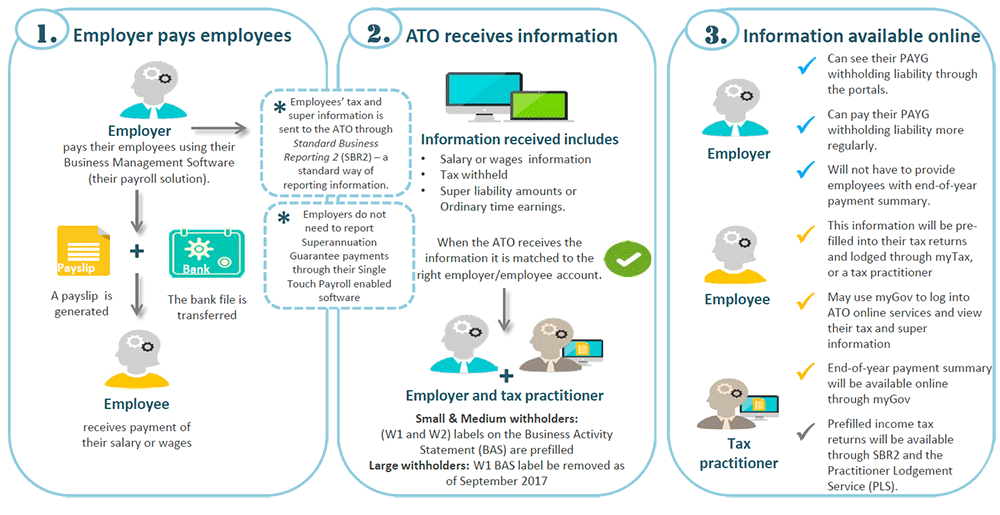With Single Touch Payroll set to become mandatory for all employers in a matter of months, we’re here to keep you updated updated on the latest developments and how to be compliant.
Single Touch payroll (STP), the new Government initiative aimed at streamlining employers payroll reporting obligations, revolutionises the way employers report payroll information to the ATO. IN essence, STP is a new reporting mechanism, whereby each time an employers pays their employees, the employer will also send the ATO their STP data (such as salary, wages, allowances paid and the PAYG withholding on these payments) from their payroll software.
This is done through an “STP pay event” that captures each weekly, fortnightly etc pay cycle. If employers need to, they will be able to make corrections to employee year-to-date amounts in the following STP pay event.
On the superannuation front, under STP, employers will continue to report and pay their employee’s superannuation entitlements thought their existing SuperStream solution. What will change, however, is the requirement to report employee’s super liability or ordinary time earnings (OTE) each pay day. This is based on the amounts employers currently provide on an employee’s payslip.
To be clear, no additional reporting is required under STP – it’s just a new method of reporting. STP reporting has been compulsory for larger employers since 1 July 2018, and will start for smaller employers (those with less than 20 employees) from 1 July 2019.
HOW STP WORKS
To be STP-compliant, an employer must typically:
- adopt STP-compliant software. The software must also generate ATO and Fair Work-compliant payslips each pay period, and also calculate and process termination payments. The payroll software of most major software houses is now STP-compliant and enabled
- enter employee details accurately in the software
- complete standard field fetails in all the fields requested by your software (STP does not require any additional information to be reported)
- provide ATO and Fair Work-compliant payslips to employees at the time of payment
- calculate SG entitlements, and
- consider all workarounds that may not exist in your payroll processes and banking instructions to automate them within your software program
The ATO diagram below illustrates how STP works:

SMALLER EMPLOYEES
The ATO is recommending that smaller employers join the almost 15,000 other smaller employers who have already voluntarily opted-in early to STP. By opting early, smaller employers can enjoy the advantages for STP including:
- streamlining the reporting process. Payroll information is reported at the same time employees are paid; thus avoiding the need for action at a later date
- not being require to provide payment summaries to employees at year-end
- efficient employee on-boarding. Some digital service providers will offer employee commencement forms – such as TFN declarations and withholding declarations – through their STP software. If this is available, employers have the option to invite their employees to complete these online forms via their STP-enabled software, and
- minimising reporting errors. The ATO will be able to pre-fill employer activity statements which in turn reduces the potential for the employer human error
RELIEF FOR MICRO EMPLOYERS
The ATO acknowledges that there are a significant number of very small employers who do not use any type of payroll software when processing the pays each week / fortnight etc. Consequently, micro-businesses (employers with 1 to 4 employees) will not be required to adopt / buy payroll software in order to comply with STP reporting. For more employers, their STP solution will be to adopt STP-compliant software. However, microbusinesses according to the ATO, be provided with alternative STP compliance options.
According to the ATO, these solutions may include mobile apps and portals. The ATO has published a list of 24 companies intending to provide such solutions, with the list soon to be updated to include information about products these companies will offer.
FLEXIBILITY
The ATO has indicated that it will be flexible with the commencement date of 1 July 2019, including the provision of deferrals to help stagger the uptake. Importantly, from a compliance standpoint, the ATO states that employers need not be concerned about penalties for the first 12 months after the 1 July 2019 start date because the primary aim is to help employers get the new system bedded down.
For more information on STP, or whether you are eligible for an exemption, please contact of office today.

